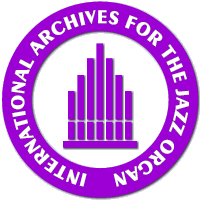
The Jazz Organ Scene
Canada


|
Kathy Kidd
One of the many remarkable aspects of Kidds Hajji album was her playing on a massive
pipe organ, which she recorded at St. Andrews-Wesley Church on Burrard. Kidd wanted
"Organ Gloria", the albums final and most impressive song, to end with a grand crescendo.
To make that happen, Kidd sustained the last chord while her husband Ron Dabby feverishly
pulled out all of the organs stops to create more volume. "Thats what our life was all
about," says Dabby. "I was running around pulling out all the stops and she was jamming."
Its a great image that says a lot about the couples rare partnership. The thought of Kidd revelling in the splendor of the musical moment also partially helps soothe the shock of her passing. But no one in Vancouvers jazz and world music community, which deeply admired Kidd, was prepared for this. Few people knew she was sick. In 2000, Kidd started experiencing chest pains. After three weeks in hospital Kidd was diagnosed as having melanoma, the same type of cancer she defeated 20 years earlier. This time the cancer had spread so the prognosis was bleak. Kidd stayed at home for a while but her breathing became increasingly laboured. She went back to the hospital, where Dabby, his daughter Bryna and four friends who happen to be nurses women Dabby calls "angels of mercy" stayed with her. Kidd passed away in the early morning of 18th November 2000. Just two days later, St. Andrews-Wesley was packed with people for the service celebrating Kidds life. If all of the many musicians who came had brought their instruments, an amazing jam session could have ensued, which Kidd would have relished. As it turned out, there were heartfelt musical tributes. For two pieces, Sal Ferreras, Mandido, Fana Soro and Pepe Danza played African drums, which were so important to Kidds music, alongside saxophonist Graham Ord. Ferreras, Bryna Dabby, and the two reverends Gordon Turner and Max Warne also spoke eloquently about Kidds incredible spirit. Born in Peterborough in 1949, Kidd was a classically trained pianist who earned a Masters of Social Work from the University of Toronto. At 20, she travelled to countries such as Afghanistan, Algeria, India and Iran. Kidd also went to the Creative Music Studio in Woodstock, New York, where she learned from the likes of Jack DeJohnette, Nana Vasconcelos and Collin Walcott. After moving to Vancouver, Kidd established herself as one the citys premier musicians playing Latin music. She worked with groups like Salsa Ferreras and Dido and the Hand People, along with her own ensembles, including a strong septet. Kidd also taught at Vancouver Community College. In 1991 Kidd went to New York, where she studied with leading Latin pianists and learned about Yoruban culture, the basis for the Afro-Cuban music she was passionate about. Following that trip, major players in New Yorks Latin scene such as Andy Gonzalez and the now-prominent David Sanchez played on her Do What You Love album, which got a four-star review in Down Beat magazine. Kidd was also inspired to compose the YeMaya Suite, an Afro-Cuban jazz suite, which she worked on during a two-year stay in Paris. Kidd had the talent and chutzpah to put together a band with top African and Latin musicians in the French capital. Thats also where she fully developed her concept of connecting African, Latin and Arabic music. Back in Vancouver, Kidd and her band Kongo Mambo premiered the YeMaya Suite at St. Andrews Wesley. She would play many times in the church, including gigs that were part of Reverend Turners Jazz Vespers series. Kidd also spent countless hours in the sacred space learning the complexities of the organ from Darryl Nixon and practicing on her own. (Near the end of the memorial service, Nixon played a thunderous piece, which Kidd had been working on. Nixons performance was thoroughly cathartic.) All of these musical threads came together with Hajji, which seamlessly combined Afro-Cuban, West African, Arabic and Western classical rhythms and melodies. Hajji showed that Kidd fully deserved to be on the world stage. She wasnt frustrated by how true recognition was slow to come. As Kidd put it, "Success for me is just doing it." Kidd had so much more music to express. She was composing a huge symphonic, choral and organ work, based on her research of Central African music. Kidd was even learning how to use a sampler so she could sample drums to accompany herself for solo organ concerts. Chris Wong on VancouverJazz.com |
| contact: | |
| homepage: |
|
Hajji Lowrider Records recorded 1999 at St. Andrews-Wesley Church on Burrard/Canada |
Kathy Kidd, piano, pipe organ Miguel 'Anga' Diaz, percussion, congas Brice Wassy, drums François Houle, clarinet Graham Ord, tenor sax, flute Guy Nsangué, bass Moussa Sissokho, talking drums, djembe, sabar Ron Allen soprano sax, sopranino sax, Persian and Arab ney flute Maryam Toumrai, vocals |
 |
n/a |
| n/a |
|
You can watch the video on the YouTube site by clicking on the corresponding picture. For more videos search YouTube |
|

|
|
Back
If you don't see the left hand menu,
please go back to the homepage.
Back to the homepage